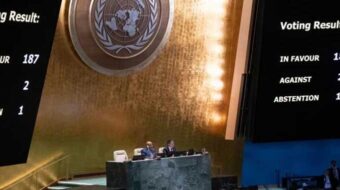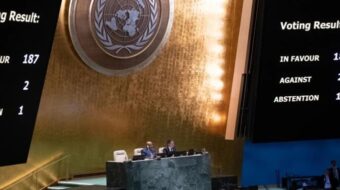
Congress could be on the verge of ending the U.S government’s ban on travel by its citizens to Cuba. The passage of HR 4645 through the House of Representatives Agricultural Committee by a 25-20 vote on Thursday had supporters celebrating.
By linking the repeal of the 50-year-old travel ban with the removal of obstacles to the sale of U.S. agricultural commodities, the bill’s sponsors appear to have brought together the broad coalition needed to move past the die-hard anti-Cuba lobby.
HR 4645, the Travel Restriction Reform and Export Enhancement Act, was introduced by Agriculture Committee Chairman Collin Peterson, D-Minn., and co-sponsored by Republican Committee member Jerry Moran of Kansas. Supporters testifying at committee hearings in March ranged from Human Rights Watch to the U.S. Chamber of Commerce and the American Farm Bureau Federation.
There are big bucks at stake here, not only for the Cuban economy, but also for American farmers, according to testimony at the Committee hearings.
Due to their proximity, Cuba and the U.S. are natural trading and travel partners. The Chamber of Commerce describing itself as “a long-time opponent of the embargo” pointed out in a press statement that prior to the 1960 embargo the U.S accounted for 70 percent of Cuba’s international trade. It was the U.S.’s 7th largest market for exports, especially for farmers and ranchers. The Chamber estimates that the embargo costs the U.S. economy more than $1.2 billion annually in lost trade.
Roger Johnson president of the National Farmers Union testified about his frustration with a lost deal for farmers in North Dakota. On a visit to Cuba, a delegation found that “the Cubans were interested in potatoes coming out of the Red River Valley, both table stock and seed potatoes.” Even though deals were negotiated for these sales they are stymied by current law. “We were left in our department and the Minnesota Department of Agriculture and the Department of Agriculture in the State of Maine trying to negotiate those requirements with the Cubans and then coming back to the State Department and to USDA. We never got it all done. It just never happened and the sales have never happened as a result of it,” he concluded.
Barton Schott, a family farmer from Kulm, N.D., testified on behalf of the National Corn Growers Association. “The Cuban embargo is working,” he stated bluntly, “it is working against U.S farmers and ranchers.” U.S. corn farmers have a competitive disadvantage compared to competitors in Brazil and Argentina because of the added expenses caused by current restrictions which entail third party banking and unusual pay in advance requirements. Even with the restrictions, Schott pointed out that poultry exports to Cuba reached 146,000 metric tons in 2008 which required 10.9 billion tons of feed corn to produce.
On the other hand, the prohibition on travel by U.S. citizens to Cuba costs that country nearly half a billion dollars annually. Prior to the prohibition on travel, 80 percent of U.S. citizens who traveled to the Caribbean visited Cuba. The American Association of Travel Agents says that if the existing prohibition were lifted, 1 million Americans would visit the island during the first year, and in the following five years that number would rise to 5 million. If the prohibitions were lifted, Cuban tourist sectors would take in $567 million annually, according to studies cited by Cuban historical researcher Andres Zaldivar Dieguez.
According to testimony from the Farmers Union Roger Johnson, ending the travel ban would also result in a boon to the U.S. agricultural industry. “One of the big things it does,” he stated, “is it allows more income into the system so that they can purchase more agricultural products.” Johnson added that also “there would be a demand for more value-added products from the tourists. [We] have spent a lot of time and effort working on trying to expand value added in agriculture so that we export higher value products instead of just raw commodities,” he added.
Cuba is the only country the U.S. government forbids its citizens from visiting.

MOST POPULAR TODAY


Zionist organizations leading campaign to stop ceasefire resolutions in D.C. area

High Court essentially bans demonstrations, freedom of assembly in Deep South

Communist Karol Cariola elected president of Chile’s legislature

Afghanistan’s socialist years: The promising future killed off by U.S. imperialism






Comments